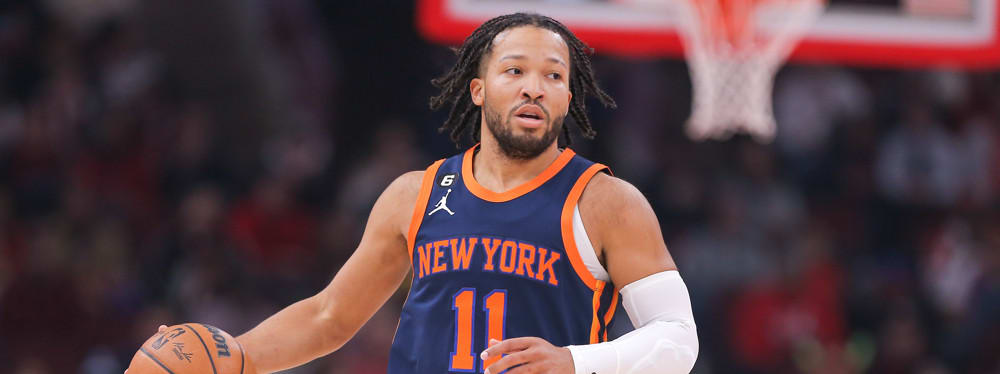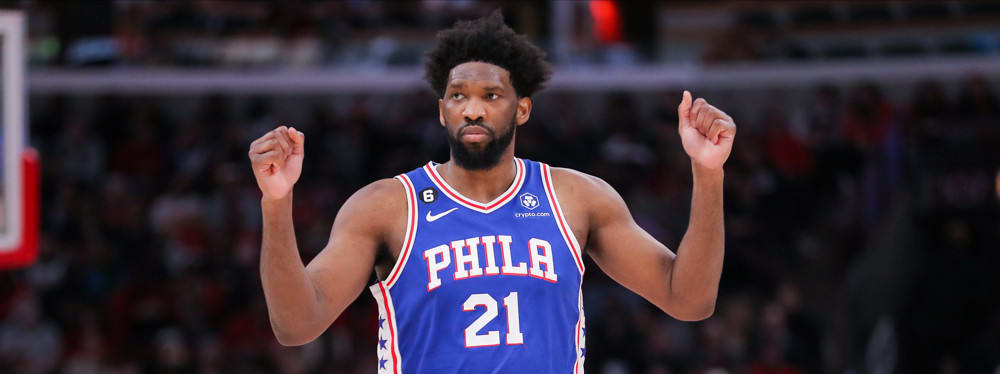Recent RotoWire Articles Featuring Joe Harris
See More
After spending the past three years in Brooklyn, Harris was traded to the Pistons during the offseason. Although he played 74 games during the 2022-23 campaign, Harris was limited to just 20.6 minutes per night, the fewest he has played since the 2015-16 season. He finished well outside the top 200 in standard leagues, averaging 7.6 points and 1.9 three-pointers. The Pistons are by no means poised to make a title run but are enamored with some of their young guards. Harris will have to compete for playing time with Ausar Thompson, Jaden Ivey and Alec Burks, all of whom could be ahead of him in the rotation. At best, Harris should be viewed as nothing more than a potential streaming option if and when he lands a meaningful role.
Coming off a season in which he played just 14 games, Harris could struggle to put up anything but deeper league value. His role is fluid at the moment, with Kevin Durant and Kyrie Irving both candidates to be traded. While he should remain one of the more efficient perimeter scorers in the league, the issue, at least initially, will be health. Harris underwent two surgeries on his ankle last season, one in November and one in March. He is slated to be healthy for training camp, but given the severity of the injury, the Nets are likely to play it safe out of the gate. He'll also compete with Seth Curry, Cam Thomas and Patty Mills for playing time. Having cracked the top 100 once in his career, it feels like that mark could be a challenging goal moving forward. His lack of supporting production pigeonholes him as a specialist, so he can probably be avoided in all standard league drafts.
Harris is coming off the best fantasy season of his career by a small margin, with the sharpshooting wing ranking 115th overall on a per-game basis. Surrounded by the talent of James Harden, Kevin Durant and Kyrie Irving, Harris was able to shoot a league-high 47.5 percent from three-point range, hitting 3.1 per game to help fuel his 14.1 points. He also averaged 3.6 rebounds and 1.9 assists and shot a career-high 50.5 percent from the field. Harris was the eighth-most efficient player in the NBA on a true-shooting percentage (66.3) basis. Harris' role shouldn't change heading into 2021-22. It's almost a guarantee that he'll start at small forward and see roughly 30 minutes per game. His only real competition for minutes are Patty Mills and Bruce Brown, but Brown can play practically any position and Mills can play both guard slots. Ultimately, Harris is a quality fantasy selection at around pick 100. He's a prototypical high-floor, low-ceiling player. At this point, you know exactly what you're getting from him on a night-to-night basis, and that's some of the best three-point shooting in the league.
Harris is coming off another strong season with the Nets, primarily acting as a sharp-shooting wing. In 30.8 minutes of run, he averaged career highs in points (14.5), rebounds (4.3) and threes (2.5) while also dishing 2.1 assists. Ahead of the 2020-21 campaign, the 29-year-old ranks fifth in three-point percentage (42.6) among active players. And over the past two seasons, he's had 16 performances with at least five treys. Brooklyn made it a priority to keep him on the roster, signing him to a four-year, $75 million deal. Harris should continue playing the same role as he has been, though fewer points may be available for him given the addition of Kevin Durant. Still, he could worth a pick late in standard fantasy leagues, as he ranked 138th per-game last season.
Harris has increased his averages across all categories for the second straight year. He made a name for himself as one of the league's best long-range shooters in 2018-19, as the Virginia product won the Three-Point Shootout at All-Star Weekend and led the NBA in three-point efficiency with an excellent 47.4 percent mark. He finished his fifth season with career-highs in points (13.7), rebounds (3.8) and assists (2.4). Harris also shot 50.0 percent from the floor, despite more than half of his shot attempts coming from downtown, and he canned 2.4 threes per contest. He played 30.2 minutes per game in 76 starts -- both career-best marks -- and he's likely to open the season as Brooklyn's starting shooting guard. The arrivals of Kyrie Irving and DeAndre Jordan may be a positive for Harris, who could see more open looks as a result of increased defensive attention to his teammates. Harris doesn't offer much on defense, but he's become a well-rounded player on offense thanks to his elevated play and could take yet another step forward in 2019-20, making him an interesting fantasy prospect.
In his second season with the Nets, Harris' contributions became more significant and he found himself in a prominent rotation role. He came off the bench for much of the year, but was the next guy up to jump into the top unit when either starting wing, Allen Crabbe or DeMarre Carroll, missed a contest. As a result, Harris picked up 14 starts across 78 games and found himself averaging a career-high 25.3 minutes per game. The 26-year-old's ability to open the floor with his three-point shooting is his main calling card. He shot a scorching hot 41.9 percent from deep and dropped 1.9 three-pointers per game. He also shot just under 50 percent from the field and 82.7 percent from the free-throw, so to say he was efficient would be an understatement. However, Harris added just 10.8 points, 3.3 rebounds and 1.6 assists, so his contributions for Fantasy purposes lied for the most part in his three-point totals. Still, the Nets liked his overall development and opted to re-sign him to a two-year, $16 million extension this offseason. With Crabbe and Carroll back, Harris should slot into his reserve wing role to start the year once again and he'll battle Caris LeVert for the backup wing minutes. Look for Harris to be a deep league option as a deep ball specialist, but his lack of contributions elsewhere will limit his utility in shallower leagues.
Following two years with LeBron James and the Cavaliers, Harris spent the 2016-17 campaign with the Nets, more than doubling his previous high in playing time with 21.9 minutes per game. That easily translated to his best year as a professional, averaging 8.2 points, 2.8 rebounds, 1.0 assist and 1.6 three-pointers as a key reserve for Brooklyn. Harris' ability to shoot from three-point land is his best attribute, exemplified by his 38.5 percent clip from beyond the arc last season. However, the Nets added the likes of D'Angelo Russell, Allen Crabbe and DeMarre Carroll in the offseason, all of whom are capable shooters from distance, which is going to severely hurt Harris' value moving forward. Crabbe, specifically, is going to take over as the team's top three-point threat, which is going to leave Harris in just a minor bench role. With a decent drop in minutes set for the upcoming campaign, Harris will likely be off the Fantasy radar in the majority of formats.
Harris began last season as a non-rotation player for the Cavaliers before undergoing foot surgery and getting traded to the Magic as a throw-in in the Channing Frye deal. The former Virginia star was subsequently waived and spent the rest of the season recovering from the procedure. Harris will get a fresh start with the Nets, but he faces an uphill battle to finding consistent minutes, even on one of the league's worst rosters. While he's a strong defender and underrated athlete, Harris has struggled shooting the ball in limited action (career 39.5% mark from the field) and has been only average in a handful of D-League stints. With Rondae Hollis-Jefferson, Bojan Bogdanovic, Caris LeVert, Randy Foye and Sean Kilpatrick all firmly ahead of Harris on the depth chart, don't expect him to make more than a minimal impact in 2016-17.
Perhaps the best thing about Joe Harris' rookie season is that through the first half of the season, he was able to stay off of the NBDL's Canton Charge. For a five-game stretch in November, Harris played at least 19 minutes and averaged 6.2 points as a rotation piece for the early Cavaliers. Once the calendar flipped to January (with J.R. Smith and Iman Shumpert coming on board), Harris learned the route between Cleveland and Canton very well. He was assigned and recalled 11 times. All told, Harris appeared in 51 games for 10 minutes per game. He hit 40 percent of his field goals and 60 percent of his free throws on his way to 2.7 points per game. Harris added 0.6 three-pointers, 0.8 rebounds, 0.5 assists, and 0.1 steals. The 6-6 guard only made token appearances in the playoffs, but he was on the roster. With the same players ahead of him on the roster (in addition to Richard Jefferson), Harris may spend more time with the Charge this season, where he averaged 14.1 points and 5.4 rebounds over 32 minutes in 11 games. Should Cleveland once again be hit by injuries, Harris could find a nice role as a 3-and-D player.
Joe Harris was the second-round pick of the Cavaliers in the 2014 NBA Draft. He was taken 33rd overall. While his statistics from his senior season at Virginia were good but don't standout. He provided 12.0 points on 44 percent from the field, 3.0 rebounds, 2.3 assists per game. There are plenty of other factors that went into his becoming a pro. First, he hit 41 percent of his three-pointers over his four-year collegiate career. Second, Virginia was one of the slowest paced (euphemistically called "defensively oriented") teams in the nation, so Harris' counting numbers were diminished by the team's style. It's no euphemism that Virginia played stringent defense under coach Tony Bennett, and Harris was at the lead of the defensive attack. He averaged 16.3 points as a junior before Malcolm Brogdon arrived to balance the offense. The 6-6 guard possesses adequate size to be a solid defender in the NBA. The problem will be earning playing time behind Dion Waiters and Mike Miller. Harris may spend time learning the ropes in the D-league, but he should be mature enough to step in and hit some three-pointers.












